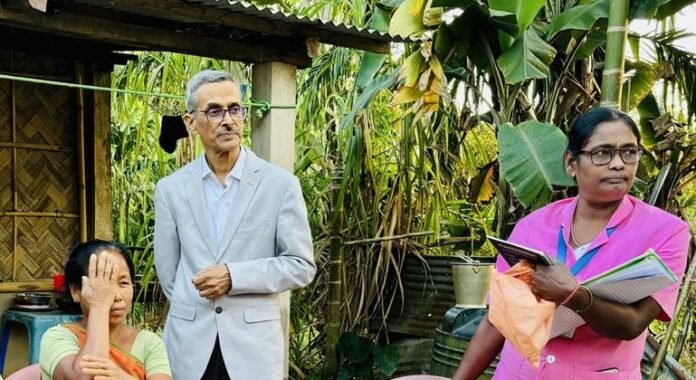It was five years ago when primary school teacher Mohan Rangpeh started having difficulty reading the blackboard. For the past decade, he had been seeing the world around him blurry, but he accepted it as a normal part of aging. But when her poor eyesight began to affect her ability to teach, she began to fear losing her job and became stressed.
Nevertheless, Mohan Rangpeh did not seek any help as he did not want to worry his wife Sunduki Tarang. But what he didn’t know was that his wife, who worked at weaving beautiful traditional patterns on cloth, was also worried about his failing eyesight and was reluctant to tell him.
This problem is not limited to them. Uncorrected refractive errors are one of the leading causes of vision loss in all age groups. A large section of the population suffers from this eye problem and it is a major cause of blurred vision in the child and adult population.
In this condition the eye cannot focus clearly on any image and the vision becomes blurred.
In India, more than half of the population is experiencing some form of refractive error-related visual impairment. However, its treatment is very simple – just one pair of the right number of glasses is enough.
Yet, only 36% of people worldwide have glasses suitable for farsightedness, while more than 800 million people suffer from farsightedness that cannot be easily corrected with reading glasses.
Lack of access to such affordable glasses not only affects quality of life, but workplace vision impairment affects productivity and costs an estimated $411 billion annually.
Unique initiative
To address this gap and provide quality, affordable and people-centred refractive error services, the World Health Organization (WHO) launched a program called SPECS 2030. Its global goal is to increase refractive error coverage by 40 percent by 2030.
In India, the WHO SPECS 2030 initiative was launched in the city of Guwahati, Assam. It was attended by key stakeholders in education, social justice, health research and healthcare (public, private and NGO), including the Ministry of Health and Family Welfare, Government of Assam and WHO.
The World Health Organization (WHO) is assisting the Government of Assam in the phased implementation of SPECS 2030. It began by demonstrating the feasibility and effectiveness of its implementation in various healthcare settings.
One model is Guwahati’s Sri Shankardeva Netralaya, which conducts door-to-door eye tests in rural and remote areas as a community-focused initiative. After examination, free spectacles are provided for correction of refractive error and referral to other specialists for treatment/surgery.
Under this initiative, Mohan Rangpeh and Sunduki Tarang were examined at their homes by accredited social eye care workers and given free glasses to correct refractive errors.
Another beneficiary, Moni Ram Ingati, works as a basket weaver in Sonapur. About getting glasses, she said, “I was working without glasses, but now I can work better. My brother also tested my glasses and he also saw well. Now he wants to get his own glasses.”

Few people understand the importance of taking care of their vision due to lack of awareness. Additionally, eye care services are not included in non-communicable disease services. Lack of human resources, high costs and poor data systems are also major challenges.
“This initiative will empower individuals and communities to reach their full potential,” said Dr. Roderico H. Afrin, WHO Representative in India
“Government agencies, health care providers, “Collaboration between NGOs and the private sector can become a strong and sustainable model for SPECS implementation that can be replicated in India and elsewhere.”

